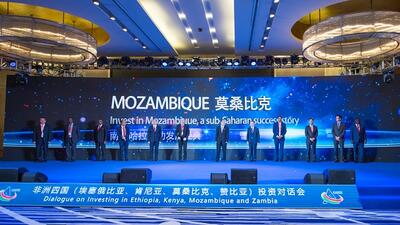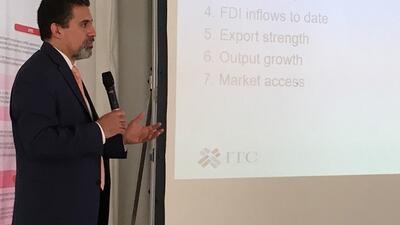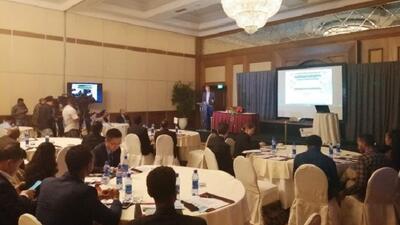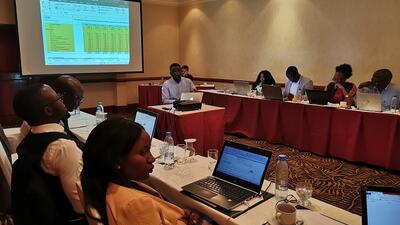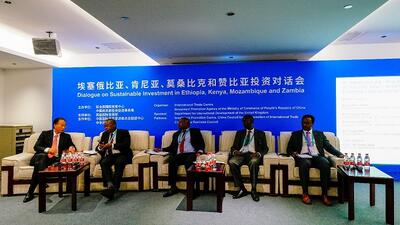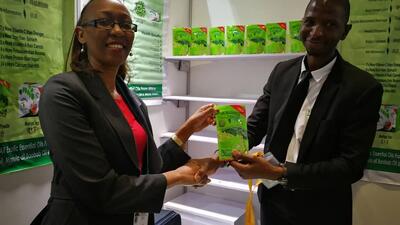ITC-supported companies strike prospective deals worth $116 million during China import expo (en)
Chili oil from Rwanda, Bolivian quinoa, Zambian pork and home décor articles from Myanmar. These are among the more than $116 million in goods and services that micro, small, and medium-sized enterprises supported by the International Trade Centre are set to supply to Chinese importers after reaching prospective deals at a prominent trade fair in Shanghai earlier this month. The leads also covered sesame from Ethiopia, tea and coffee from Kenya, pashmina and beeswax products from Nepal, and tourism and film-making services from multiple countries.
Rapid growth and rising domestic consumption have propelled China to its current status as the world’s second-largest economy and importer. But while Chinese demand is creating enormous economic opportunities, micro, small and medium sized enterprises (MSMEs) from developing and least developed countries often struggle to export to China, due to the language barrier and constraints such as a lack of understanding of its market dynamics and requirements.
China has partnered with ITC since 2014 to promote trade between China and other developing countries, focusing on least developed countries in Africa and Asia.
ITC drew on this partnership, as well as the business networks created by other ITC projects, to organize train and support dozens of MSMEs and trade and investment support institutions to take part in the first China International Import Expo (CIIE), from 5-10 November in Shanghai. The event, the first of its kind, gathered together 150,000 domestic and foreign professional buyers, as well as exhibitors from 100 countries. It provided an unprecedented opportunity for companies to make inroads into the Chinese market.
ITC identified 74 MSMEs from Bangladesh, Bolivia, Cambodia, Ecuador, Ethiopia, Kazakhstan, Kenya, Kyrgyzstan, Lao PDR, Mozambique, Myanmar, Nepal, Nigeria, Rwanda, Tajikistan, Thailand, Uganda and Zambia, working in three sectors: food and agricultural products; apparel, accessories and consumer goods; and services. The businesses were selected based on their readiness to export, their potential to export to China, and their willingness to share the costs of participation.
In the run-up to the fair, ITC supported the enterprises with registration assistance together with e-learning courses and advisory services on export sales and negotiation, cross-border contacts, transports and logistics, and trade fair participation in China. ITC produced catalogues in English and Chinese to showcase the MSMEs’ products and services; it also identified and contacted professional buyers to facilitate matchmaking for buying, selling and investment.
At the CIIE, the businesses exhibited their goods and services to potential buyers at stands within the sector-specific exhibition halls under the ITC umbrella. ITC also had a pavilion of its own to promote the companies and explain the organization’s broader work to participants at the trade fair.
Experts from ITC supported the companies through the preparation and signing of letters of intent to do business with China-based companies.
The meetings in Shanghai proved fruitful. While the specific details of prospective sales deals must be kept confidential at this point, Zambian agribusiness firms concluded letters of intent to supply pork, rice, and cashews worth close to $90 million to counterparts in China. Companies from Ethiopia, Kenya and Rwanda struck tentative deals to export coffee to China. Five companies from Tajikistan have agreed to supply cotton yarn, socks, sportswear, and felt slippers to Chinese importers. Bolivian companies are set to sell quinoa, beans, and dehydrated fruit into the Chinese market. And tourism operators in Myanmar and Nepal are poised to start catering to the growing number of Chinese tourists travelling around the world.
Having gone into the CIIE with guarded expectations about their prospects of exporting to China, many of the participating were pleasantly surprised by their success at the fair.
‘The exposure we have had in CIIE is wonderful and is beyond imagination,’ said Swoyambhu Ratna Tuladhar of Yak & Yeti Enterprises, a Nepali handicrafts company that was showcasing its products at the international level for the first time.
‘This is a game-changing opportunity,’ added Daisy Sandu, who runs Daisy Meat in Zambia.
‘We had wonderful sales,’ reported Maung Maung Aun of Aungwood a Myanmar-based home décor company, while thanking ITC for its support.
‘ITC not only helped us to face new business in China, it also encourages us to insist, persist and never give up,’ said Americo Mijal Loredo Gantier of Agroexportaciones del Sur, a Bolivian food company.
ITC will continue to provide advisory and technical services to these companies as they seek to see the prospective deals through to completion. ITC will also develop recommendations for how companies could further enhance their prospects at future editions of the CIIE.




